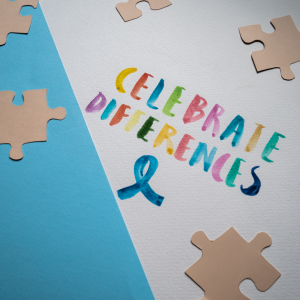A Shift from Autism Awareness to Autism Acceptance
A Shift from Autism Awareness to Autism Acceptance
 National Autism Awareness Month was first held in April 1970 by the Autism Society. It was established with the intent and goal to educate and bring awareness of autism to the public. The Autism Society defines autism or Autism Spectrum Disorder (ASD), which includes Asperger’s Disorder and Pervasive Developmental Disorder – Not Otherwise Specified, as “a complex, lifelong developmental condition that typically appears during early childhood and can impact a person’s social skills, communication, relationships, and self-regulation. The Autism experience is different for everyone. It is defined by a certain set of behaviors and is often referred to as a ‘spectrum condition’ that affects people differently and to varying degrees.” You may learn more about autism here.
National Autism Awareness Month was first held in April 1970 by the Autism Society. It was established with the intent and goal to educate and bring awareness of autism to the public. The Autism Society defines autism or Autism Spectrum Disorder (ASD), which includes Asperger’s Disorder and Pervasive Developmental Disorder – Not Otherwise Specified, as “a complex, lifelong developmental condition that typically appears during early childhood and can impact a person’s social skills, communication, relationships, and self-regulation. The Autism experience is different for everyone. It is defined by a certain set of behaviors and is often referred to as a ‘spectrum condition’ that affects people differently and to varying degrees.” You may learn more about autism here.
In 2020, the Autism Society of America moved from “Autism Awareness Month” to “Autism Acceptance Month.” This shift in perspective aims to foster a more inclusive environment that improves support and opportunities in housing, education, employment, long-term services, and health care to people on the autism spectrum. President and CEO of the Autism Society of America, Christopher Banks explains, “While we will always work to spread awareness, words matter as we strive for autistic individuals to live fully in all areas of life. As many individuals and families affected by autism know, acceptance is often one of the biggest barriers to finding and developing a strong support system.”
Although there hasn’t been a formal declaration of Autism Acceptance Month, the United Nations has designated April 2nd as World Autism Awareness Day. In honor of the day, last year the UN hosted a virtual panel titled “Inclusion in the Workplace: Challenges and Opportunities in a Post-Pandemic World.” You can watch the panel here. This year they will be hosting another panel on Friday, 8 April 2022 from 10:00 – 11:15 a.m. EST. This panel, titled “Inclusive Quality Education for All,” will discuss how the pandemic caused a disruption in learning and services for many students and how this may have contributed to inequalities in education. For more information on the panel and how to register click here.
It is important to recognize that “Autism Acceptance Month” isn’t a new concept. Although the Autism Society of America is now advocating for the federal government to officially designate April as “Autism Acceptance Month,” other organizations have used the terminology for years. For example, the Autistic Self Advocacy Network (ASAN) has referred to April as Autism Acceptance Month since 2011.
But does the move to the term “acceptance” mean that “awareness” is no longer important? Of course, not. Both awareness and acceptance are key in fostering an environment that allows for people of all abilities and differences to thrive. The shift simply highlights that awareness, while a good starting point, isn’t enough on its own. Acceptance through engaging in conversation, learning of another’s perspective, and embracing what makes us all unique individuals can lead to us all celebrating neurodiversity and fostering environments where everyone is given the opportunity to shine.
To learn more about Autism Acceptance Month visit https://autismsociety.org/autism-acceptance-month/
Contact Us




 .
.
Latest News